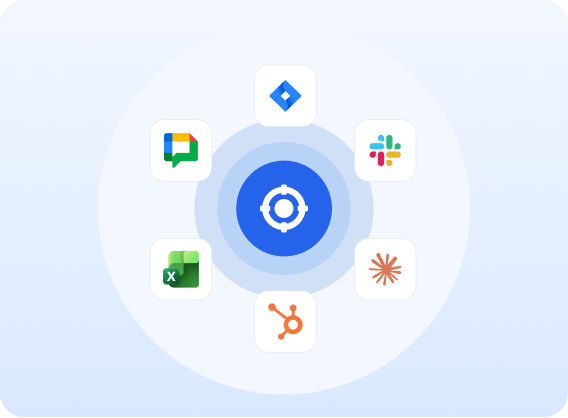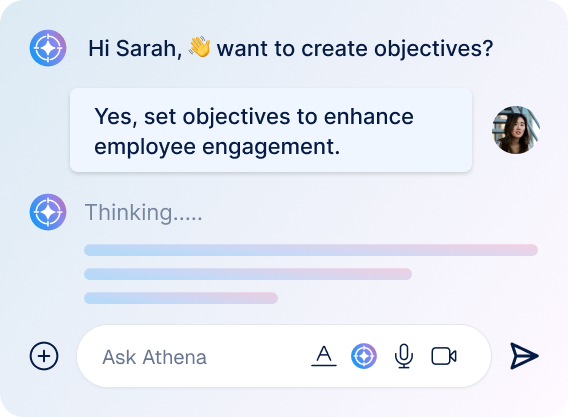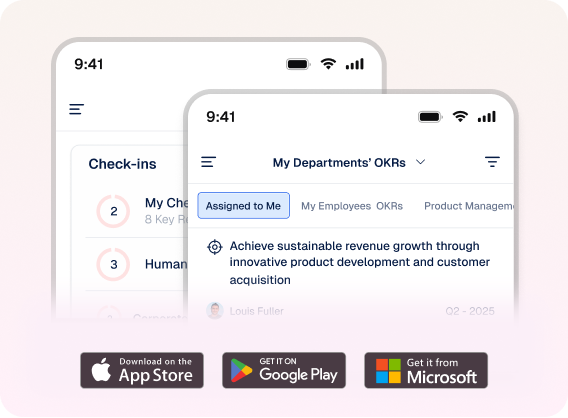Imagine a workplace where employees start their day feeling energized and motivated. A place where their concerns are addressed and their talents are fully utilized. This vision can be achieved by mastering the integration of people management and performance management.
Traditionally, performance management has been the primary focus, emphasizing goal setting, progress tracking, and accountability. However, in the modern work environment, employees seek more. They want to feel valued, heard, and part of a larger mission. This is where people management becomes crucial.
People management focuses on fostering a positive work environment where employees feel supported, empowered, and enthusiastic about their work. It addresses the underlying motivations and well-being of employees, complementing the goal-oriented nature of performance management.
People Management vs. Performance Management| Aspect | People Management | Performance Management |
|---|---|---|
| Goals | Holistic well-being of employees | Achieving organizational goals through employee performance |
| Why | Creating a positive work environment | Ensuring work aligns with company objectives |
| Initiatives |
|
|
| Who | HR, leadership, and managers prioritizing employee satisfaction | HR, leadership, and managers focused on business objectives |
| Result | Enhanced engagement, loyalty, and retention | Improved performance, productivity, and strategic goal achievement |
The Synergy Between People Management and Performance Management
Performance Data Fuels People-Centric Management
Performance management provides a structured framework for setting goals and tracking progress. Performance management software allows continuous tracking, offering a detailed picture of employee performance patterns. For example, if an employee falls behind on tasks, data allows for proactive interventions like adjusted goals or targeted support.
People management uses this data to understand employee needs, identify roadblocks, and create a supportive environment. Performance data removes biases from feedback conversations and provides a reliable foundation for addressing individual challenges, leading to improved morale and engagement.
Enhancing Employee Engagement
Research by Gallup indicates that engaged employees are 21% more productive and 17% less likely to leave their jobs. People management enhances engagement by prioritizing trust. Trust fosters an environment where calculated risks are encouraged, leading to innovation and breakthroughs. Additionally, trust promotes transparency, boosting engagement and job satisfaction. By focusing on employee well-being, professional development, and recognition, people management strategies cultivate a sense of value and appreciation, further enhancing engagement.
Performance Management Optimizes Employee Potential
Performance management identifies individual strengths and areas for improvement, providing insights to empower employees. People management leverages this information to create personalized development plans. With the right resources and guidance, employees can reach their full potential and contribute more effectively to the organization’s success.
“Management is about human beings. Its tasks is to make people capable of joint performance, to make their strengths effective and their weakness irrelevant.”
Key Strategies for Success
Investing in Technology
Cloud-based platforms streamline both performance and people management processes. They automate tasks, allowing for real-time feedback and goal tracking, freeing up valuable time for personalized interaction. Performance management thrives on clear goal setting, with alignment being key. Goals should remain dynamic, adapting to changing needs.
Building Open Communication
Effective people management requires understanding your team’s challenges, strengths, goals, and motivations. This starts with proactive, frequent conversations. Empathetic discussions reveal deeper insights beyond data, empowering your team and paving the way for success. Trust thrives when employees feel heard, valued, and part of the conversation.
Promoting Continuous Learning
Employees crave growth. Offering ongoing training and development opportunities keeps your team engaged and motivated. Investing in people builds loyalty. Managers play a crucial role in this, providing and receiving constructive feedback, creating an environment where employees feel supported and empowered to reach their full potential. A focus on employee development attracts top talent and fosters a culture of continuous learning
Recognizing and Rewarding Employees
Recognizing and rewarding efforts wins, and personal achievements publicly empowers individuals and foster a culture of gratitude. Performance management links strong performance to appropriate compensation through a transparent structure, sending a clear message that growth and advancement are valued. Effective performance management ensures clarity and accountability for both employees and managers.
Conclusion
While both people management and performance management play crucial roles, their true power lies in integration. By focusing on employee well-being alongside performance optimization, you create a workplace where success is a natural byproduct of a motivated and engaged workforce.
People analytics, championed by Laszlo Bock, former head of HR at Google, empowers people management with data-driven insights. These insights reveal employee trends and sentiments, allowing for targeted strategies. The “growth mindset” approach in performance management emphasizes continuous development, fostering a culture of learning and improvement.
Mastering both practices unlocks your workforce’s true potential. Implementing these integrated strategies transforms your workplace into a breeding ground for success, ensuring the achievement of objectives and creating an environment where both employees and the organization thrive.
with our team to learn more about how we can help optimize your organization’s performance!
Related Articles
-
How to Manage Agile and Waterfall Projects Together with Unified Project Portfolio Management
Karthick Nethaji Kaleeswaran Director of Products | Strategy Consultant Organizations rapidly shifted toward Agile methodologies, often abandoning Waterfall in the... Read more
-
12 Common Say-Do Ratio Pitfalls and How to Fix Them for Better Execution
Your Say–Do ratio shows how well your team delivers on promises. Most teams have problems not because they aren't good... Read more
-
How the Say-Do Ratio Helps Measure Commitment in Agile Teams
Agile teams live on a steady diet of promises and proof. At sprint planning the promise is made, and at... Read more
-
Why focusing on HRIS performance alone hurts the business
For years, people thought that performance management was an HR job, with forms, ratings, and systems made to make sure... Read more




